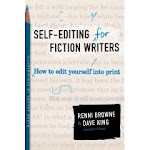I am currently working on a book I originally wrote in 1998. I polished it then to the best of my ability. I have read it several times. Time hasn’t given me objectivity; instead, I am more in love with the story than ever.
I am thankful for an honest critique partner, and she more or less hates it (she wouldn’t say so in so many words).
What’s the truth—a fairy tale romantic story or a dismal failure? Ultimately, my editor and my readers will decide.
But it brings up a problem many writers struggle with: how do we bring fresh eyes to a manuscript we’ve rewritten half a dozen times or more? Am I seeing this manuscript through the fond eyes of a mother or with a critical editor's eye?
I have no easy answers to that question, but here are a few ideas:
• Move on to another project if you have time.
• Leave this project alone between edits for as long as you can.
• If you have time and willing friends, give the manuscript to someone who has never seen it before.
• Read the manuscript aloud. Even better, have someone else read it aloud.
• Read the book from end to beginning.
• Dialogue with a trusted partner. What were you trying to do? How did it fail? (How) can it be fixed?
• Look at individual elements of the story, such as: character descriptions (consistent?); dialogue (each person unique?); timeline.
What ideas do the rest of you have? Do you struggle with this problem and if so, how do you handle it?
Monday, September 27, 2010
Sunday, September 19, 2010
I Don’t Get No Respect!
This seems to be a common refrain I hear from writers, especially those at the beginning of their career. They’ve finally worked up the courage to get serious about writing regularly and some of their closest family and friends won’t respect their time. They get calls during the times they’re writing and attitude if they don’t stop to talk. They hear comments that undermine their newfound confidence.
“You can do that, after all you stay home all day.”
“Oh come on, you’ve got nothing better to do.”
And my favorite. “It’s not like you have a real job.”
So what’s a writer to do?
First, take a deep breath and realize this problem isn’t unique to writers. It happens to everyone who works from home—I should know—my husband and I have shared a home office for the past eleven years. For some people an office isn’t an office if it isn’t off site. Not logical, but an all too common misconception. I’ve fought this battle—sometimes more successfully than others—and these are the strategies I’ve come up with.
“You can do that, after all you stay home all day.”
“Oh come on, you’ve got nothing better to do.”
And my favorite. “It’s not like you have a real job.”
So what’s a writer to do?
First, take a deep breath and realize this problem isn’t unique to writers. It happens to everyone who works from home—I should know—my husband and I have shared a home office for the past eleven years. For some people an office isn’t an office if it isn’t off site. Not logical, but an all too common misconception. I’ve fought this battle—sometimes more successfully than others—and these are the strategies I’ve come up with.
- Make certain you’re setting the example you want followed. By that I mean keep regular hours. Notice I said regular hours—not to be confused with normal ones. For years I wrote with young children in the house. That meant writing in the afternoons and after they were in bed. Just because you’re working odd hours doesn’t mean you can’t have a schedule.
- Treat what you’re doing like you’re serious. If you blow off writing for shopping and lunch several times a week your friends and family won’t understand if you don’t stop for them.
- Be consistent. If you’re not accepting calls from your mother-in-law because you’re working, don’t spend the afternoon on the phone with your best friend. Stay focused on your writing. This is even more critical if your time is at a premium.
- Recruit a support team. Instead of adversaries, enlist your friends and family to help you reach your writing goals. Communicate those goals, clearly and frequently. Ask for their help to reach them. After all, what mother doesn’t want to help her baby succeed!
- Share your victories. Let those who love you share in the joy of goals accomplished and milestones reached.
Labels:
Edie Melson,
Respect,
sabotage,
victory,
writing time
Monday, September 13, 2010
INTERVIEW WITH AN EDITOR
Many of our readers will be going to the American Christian Fiction Writers (ACFW) conference this week. Have fun! I hope to see you next year. This year I'm staying home to play grandma.
That also means many of you will be seeing an editor and/or an agent. You will talk with them at the dinner tables, in the hall, during an appointment. It's entirely possible all of your carefully practiced "elevator speeches" will fly out of your head. (It always does mine. I rarely get it in a single sentence and I've still managed to sell more than a dozen books.)
So I thought I would share some of my observations and experiences.
That also means many of you will be seeing an editor and/or an agent. You will talk with them at the dinner tables, in the hall, during an appointment. It's entirely possible all of your carefully practiced "elevator speeches" will fly out of your head. (It always does mine. I rarely get it in a single sentence and I've still managed to sell more than a dozen books.)
So I thought I would share some of my observations and experiences.
- Your passion for your story will come through and impress the editor.
- The editor is more interested in hearing from you than looking at the one sheet.
- It doesn't hurt to mention why you think this story is a good fit for their company.
- Bring samples of your writing. They won't take your chapters with them (probably) but they will read and get a sense of your ability to write.
- Accept rejections with grace.
- Don't feel you have to leave as soon as they say "no" (although you may). The appointment isn't only a sales pitch; it's also a chance to talk with an industry professional.
- The fact you are at the conference speaks volumes about you. You are committed to learning and improving. Editors appreciate this; they will be more willing to look at things from you in the future, regardless of what happens this year.
Sunday, September 5, 2010
Feeling Emotional—Don’t Tell Anyone!
Instead show them.
Telling the story, instead of showing it, is one of the most common mistakes beginners make. During the first draft almost all of us, no matter how advanced, tend to tell a lot of the story. It’s only natural. This is the time when our manuscript comes together and telling allows us to develop the bones or structure of the story before we refine it into a compelling work of fiction. But beginners often stop the refining process too early. So how do we take a story from just bare bones? One of the best ways is to add depth by showing how our characters feel without naming the emotions.
Now, I know a lot of you are probably having the same reaction I did when I first heard it wasn’t a good idea to name an emotion. I had a rather loud conversation with the writing book that first shared this nugget of information.
“You have got to be kidding me! Who made up this stupid rule? How can I tell the reader what’s going on if I don’t use words like scared or angry?”
And there is the crux of the problem—beginning writers always default back to telling the story. Writing fiction is hard work. It takes a lot of time and effort to write a book and write it well. You already know this—after all that’s why you’re taking the time to read and study about how to improve.
Like I mentioned, I didn’t have a positive reaction to my first exposure to this convention. But now it’s an aspect of rewriting that I enjoy and even look forward to. I look on this as a challenge—a game of sorts. The best part of this game is that when I, the author wins, everybody else does too. Am I nuts? Absolutely, but I am, after all, a writer!
Let me give you some examples. I’ll start each out with an excerpt where I name the emotion. Then, in the second, I'll let you see how I changed it to let the reader name the emotion by interpreting the character’s actions.
Example 1
Emotions Named:
She began to cry as shame and anger warred inside. “I didn’t do anything wrong.” Her voice sounded hoarse as she tried to control her frustration.
Emotions Implied:
Tears flooded her eyes, making his features blur as she lifted her head and tried to focus. “I didn’t do anything wrong.” Her voice came out like a croak and she tried to clear her throat, but choked on the unshed tears.
The first excerpt tells the reader what’s going on. Granted, the writing is clear, but we’ve all heard the expression that a picture is worth a thousand words. The second excerpt is that picture. It invites the reader into the action and leaves them to draw their own conclusions.
Here’s another one.
Example 2
Emotions Named:
Manaen rose, her anger giving her strength as she faced her brother. “Do not think to intimidate me.” His arrogance amazed her even as it infuriated her. “I am not a child to be bullied. My Lord’s Spirit speaks to me as clearly as to you.”
Emotions Implied:
Manaen rose in response, her eyes almost even with his as she drew herself up to her full height, oblivious of her feminine garment. “Do not think to intimidate me.” Her jaw worked as she gritted her teeth. “I am not a child to be bullied. My Lord’s Spirit speaks to me as clearly as to you.”
And a final one.
Example 3
Emotions Named:
Rage sent Josiah shooting to his feet. “I tell you, Manaen, I’ve never witnessed any Elder behave in this manner.” Josiah paced, feeling like his world was collapsing. Confusion made him restless. “I just don’t understand.”
Emotions Implied:
He shot up from the desk, upsetting the chair. “I tell you, Manaen, I’ve never witnessed any Elder behave in this manner.” Josiah prowled through the briefing area of their quarters, picking things up and setting them down again. “I just don’t understand.”
Now it’s your turn. Take one of these two sentences and show us the emotion in place of naming it.
Example 1
Susan’s agony flooded through her as sorrow mingled with guilt. “What have I done?”
Example 2
“Hello? Who’s there?” Jenny’s fear reached a crescendo as the footsteps above moved toward the stairs.
I can hardly wait to read what you come up with!
Telling the story, instead of showing it, is one of the most common mistakes beginners make. During the first draft almost all of us, no matter how advanced, tend to tell a lot of the story. It’s only natural. This is the time when our manuscript comes together and telling allows us to develop the bones or structure of the story before we refine it into a compelling work of fiction. But beginners often stop the refining process too early. So how do we take a story from just bare bones? One of the best ways is to add depth by showing how our characters feel without naming the emotions.
Now, I know a lot of you are probably having the same reaction I did when I first heard it wasn’t a good idea to name an emotion. I had a rather loud conversation with the writing book that first shared this nugget of information.
“You have got to be kidding me! Who made up this stupid rule? How can I tell the reader what’s going on if I don’t use words like scared or angry?”
And there is the crux of the problem—beginning writers always default back to telling the story. Writing fiction is hard work. It takes a lot of time and effort to write a book and write it well. You already know this—after all that’s why you’re taking the time to read and study about how to improve.
Like I mentioned, I didn’t have a positive reaction to my first exposure to this convention. But now it’s an aspect of rewriting that I enjoy and even look forward to. I look on this as a challenge—a game of sorts. The best part of this game is that when I, the author wins, everybody else does too. Am I nuts? Absolutely, but I am, after all, a writer!
Let me give you some examples. I’ll start each out with an excerpt where I name the emotion. Then, in the second, I'll let you see how I changed it to let the reader name the emotion by interpreting the character’s actions.
Example 1
Emotions Named:
She began to cry as shame and anger warred inside. “I didn’t do anything wrong.” Her voice sounded hoarse as she tried to control her frustration.
Emotions Implied:
Tears flooded her eyes, making his features blur as she lifted her head and tried to focus. “I didn’t do anything wrong.” Her voice came out like a croak and she tried to clear her throat, but choked on the unshed tears.
The first excerpt tells the reader what’s going on. Granted, the writing is clear, but we’ve all heard the expression that a picture is worth a thousand words. The second excerpt is that picture. It invites the reader into the action and leaves them to draw their own conclusions.
Here’s another one.
Example 2
Emotions Named:
Manaen rose, her anger giving her strength as she faced her brother. “Do not think to intimidate me.” His arrogance amazed her even as it infuriated her. “I am not a child to be bullied. My Lord’s Spirit speaks to me as clearly as to you.”
Emotions Implied:
Manaen rose in response, her eyes almost even with his as she drew herself up to her full height, oblivious of her feminine garment. “Do not think to intimidate me.” Her jaw worked as she gritted her teeth. “I am not a child to be bullied. My Lord’s Spirit speaks to me as clearly as to you.”
And a final one.
Example 3
Emotions Named:
Rage sent Josiah shooting to his feet. “I tell you, Manaen, I’ve never witnessed any Elder behave in this manner.” Josiah paced, feeling like his world was collapsing. Confusion made him restless. “I just don’t understand.”
Emotions Implied:
He shot up from the desk, upsetting the chair. “I tell you, Manaen, I’ve never witnessed any Elder behave in this manner.” Josiah prowled through the briefing area of their quarters, picking things up and setting them down again. “I just don’t understand.”
Now it’s your turn. Take one of these two sentences and show us the emotion in place of naming it.
Example 1
Susan’s agony flooded through her as sorrow mingled with guilt. “What have I done?”
Example 2
“Hello? Who’s there?” Jenny’s fear reached a crescendo as the footsteps above moved toward the stairs.
I can hardly wait to read what you come up with!
Subscribe to:
Posts (Atom)











